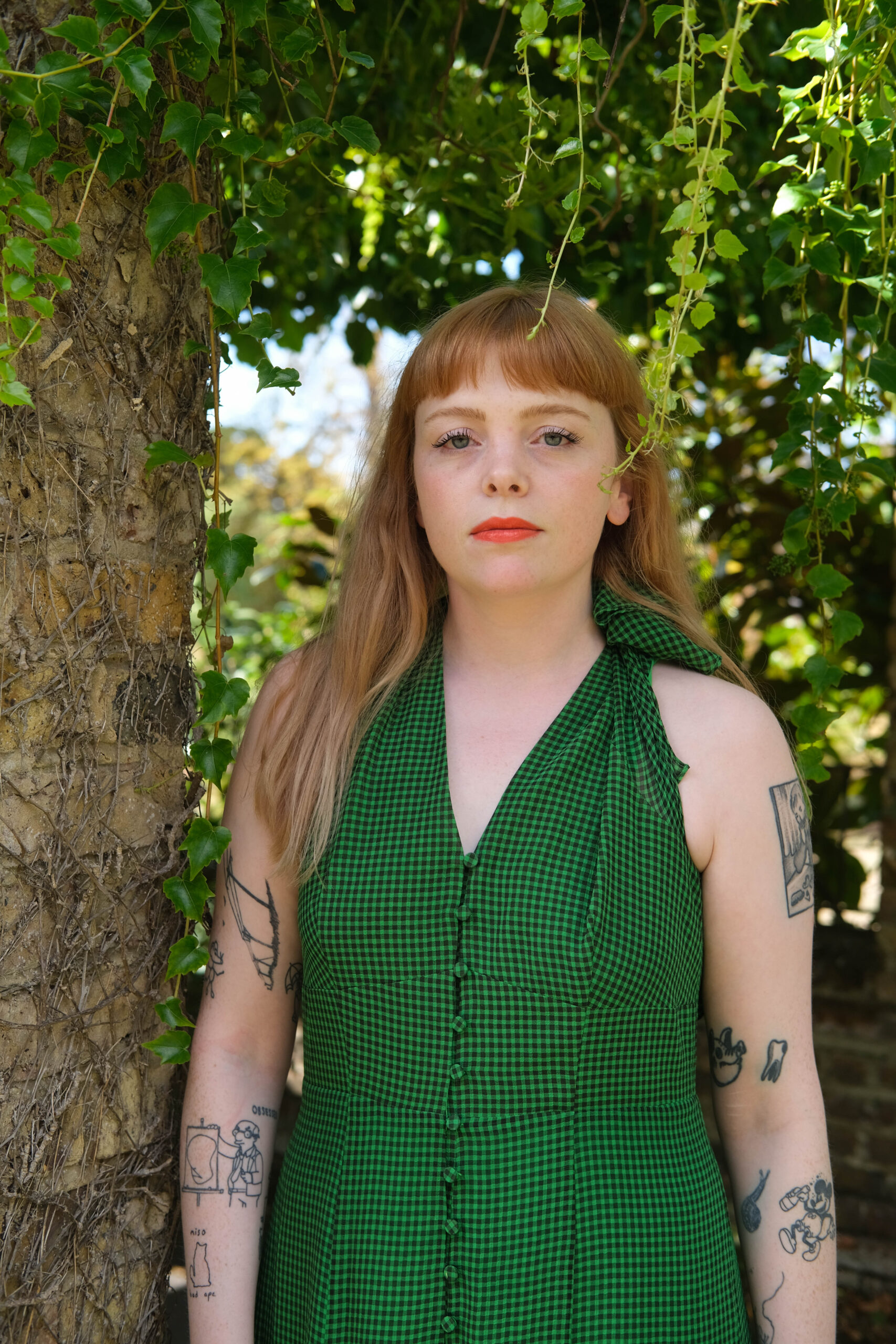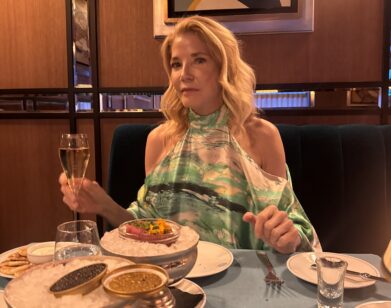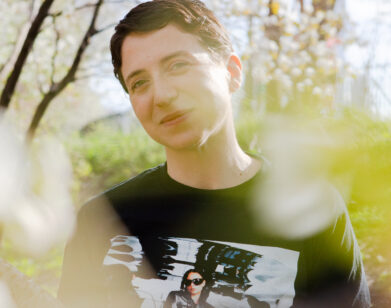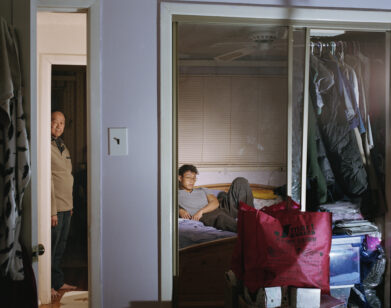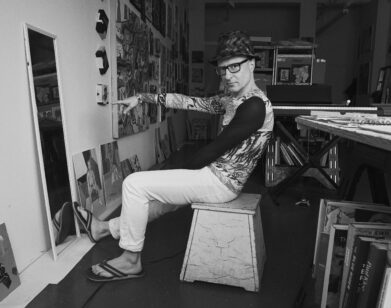LIT
Author Megan Nolan on True Crime and Trauma Plots
When we spoke in late January, the Irish novelist Megan Nolan was preparing to move from London to New York for what might be her “last frivolous, flouncing around era,” as she called it. Yesterday, she published her sophomore novel, Ordinary Human Failings, and on the morning of our call, she was announced as a finalist for the Gordon Burn Prize, which “recognises [sic] literature that is forward-thinking and fearless in its ambition and execution, often playing with style, pushing boundaries, crossing genres or challenging readers’ expectations.” The high praise is fitting for a writer whose debut, 2021’s Acts of Desperation, attracted glowing critical and popular acclaim for its vivid portrayal of obsession and female interiority.
On the surface, Ordinary Human Failings reflects a major pivot in genre—it could be categorized as a thriller or even a crime novel—but it’s much more concerned with tracking emotional and social histories than traditional clues. The story opens with the death of a toddler on a council estate in 1990s London, but quickly comes to center the Greens, an Irish family who live on the same estate, when ten-year old Lucy Green is identified as a key suspect. Though three generations of Greens dwell in close quarters, individual family members’ secrets, vices, and grievances remain mostly private until the toddler’s death and the arrival of a nosy tabloid journalist stir up memories and catalyze revelations. Nolan partly set the novel in Waterford, the city in southeastern Ireland where she grew up, and on our call we discussed writing about a version of home, the UK’s ravenous 1990s tabloid culture, and her recent viewing of Frances Ha. As she prepares to move to the big city, it was a relief, she told me, to feel “one-hundred years older” than the characters in the movie.
———
ESME HOGEVEEN: Where are you right now?
MEGAN NOLAN: Right now, I’m hiding in bed really afraid, surrounded by all my belongings that I have yet to pack in London.
HOGEVEEN: What part of London are you in?
NOLAN: I’m in Camberwell. I’ve lived here for four or five years. I’m leaving this apartment and moving to New York more or less forever. Well, not forever, but I’m leaving London.
HOGEVEEN: It must be an extremely busy time for you. I did want to ask you about your upcoming move and what it means for you in your writing practice?
NOLAN: It’s mostly just a delayed thing that was meant to happen in 2020. Then, by the time that was possible and I started spending time there, it just felt a lot more fun than London to me. I think it’s also an age thing. A lot of my friends are getting married and moving to the suburbs and having babies. I think because it’s so hard to settle down in New York, the equivalent friends I have there are more like me, unmarried and untethered and quite whimsical about where they spend their time. I felt like living that way again for a little bit. I feel like this might be my last frivolous, flouncing around era.
HOGEVEEN: What does it feel like New York is offering now?
NOLAN: Well, partly why I’m justifying it is that there’s a section of my novel that I’m working on now that is set there. So in a very basic sense, I can say it’s going to be useful to walk around these streets and have a more material sense of these places that I’m going to write about. But New York is not super sustainable for me personally. Whenever I’m there, I’m extremely busy and energetic. And then I totally crash after a couple of weeks. I would just achieve absolutely nothing if I lived here. I need some friction to rub against to produce things.
HOGEVEEN: Speaking of pressures, I was thinking about the character Lucy in your forthcoming book being in literal situations where she’s pushing herself up against the wall or seated between the sink and the toilet. I feel like there’s a sense of characters trying to find the edges of themselves or identify their limits. It made me curious how it felt for you to write this ensemble novel after Acts of Desperation.
NOLAN: It was a new challenge for me. I’ve never written straight fiction before. In some ways it was easier because of the structure of the hotel. It gave a scaffolding to things that Acts of Desperation didn’t have. I was definitely worried that it was really bad all the way through when I was writing. So, in a very boring, creative writing workshop way, it was good to be like, “Here are some rules that you can just fill out.” Also, I’d never written from a man’s perspective before and I really wanted to do that.
HOGEVEEN: I understand that you are from Waterford, and Ordinary Human Feelings is set there in the late ’80s and early ’90s. I was curious why you chose to set the book at that point in time and if that had any significance for you in reckoning with place or personal history?
NOLAN: I didn’t choose the timeline in order to do that, but once I did it, it became really meaningful to me. The reason that it’s set when it is is because of a particular tabloid culture that dwindled in its obvious evilness after a certain point in the ’90s in Britain. I wanted to set it in that peak of really nasty, salacious tabloid journalism that was very classist. Then when I started writing it, it was during a lockdown and I was living alone in London and hadn’t seen my family for a year. It became so enjoyable and so meaningful to me to write about Waterford in the ‘70s, which is when my parents would’ve been teenagers there. I was able to call them and be like, “What was the cinema called in 1978?” It was a motivating factor for how I managed to get up every day and write.
HOGEVEEN: There’s this real understanding of true crime in the book, like the interior monologue that Tom, the journalist, delivers when imagining the different scenarios that he could be encountering in the baby’s death. What’s your relationship to true crime?
NOLAN: Me and my friend, Francisco Garcia, who writes crime nonfiction, had this discussion lately. Obviously it’s good to be reflective and inquire about why we feel so entitled to these stories, what we’re getting out of them, and whether we should be allowed to re-victimize the families of these people and make these documentaries without their consent. But also, I feel like people are ponderous on this question in a way that I find a bit silly, where it’s like, of course people find these things interesting because they’re the most shocking, horrifying parts of human nature. Why on earth would you not find them fascinating? Do you remember that New Yorker piece critiquing the trauma novel about a year or two ago?
HOGEVEEN: Yes. The one that cited A Little Life, perhaps?
NOLAN: Yeah, that was definitely one of them. The thing I wanted to avoid that she calls out is that very linear, X trauma equals Y violence. I definitely didn’t want to do that, but at the same time, I find the psychology of the characters is the writing that I can do. I would love to be able to write a more classic thriller. I love reading thrillers, but I’m not a very skilled plot-maker in that way. I’m pretty sure every novel I’ll ever write will be based on the psychology of these people rather than their actions.
HOGEVEEN: There are a lot of references to the character’s Irishness, and how that’s perceived in London. Were you thinking about your own experiences living in the UK as an Irish writer?
NOLAN: I would never want to claim that the anti-immigration stuff that is so real lands on people like me, it just really doesn’t. And that’s partly because there’s a sweetheart deal between Ireland and England, which means that I can live and work here as easily as I could in Ireland. But a generation ago, my dad lived here when he was a young adult, during active IRA bombing campaigns. And people deeply hated him then and said abusive things to him. He came back to Ireland pretty soon and he’s been there ever since. He often talked about this tragic trope of Irish people who go to England to make their fortune and have this new, glamorous life, and then they come back and spend money that they don’t actually have to pretend that they have made it. That was a poignant dynamic in my mind.
HOGEVEEN: There is such an intense, widespread Western appetite for Irish cultural output right now. Are you feeling that tug?
NOLAN: Yeah. I’m curious to know if I would’ve experienced this if I was 10 years older and I published a book 10 years ago. It’s not surprising to me, because Ireland is historically a place where storytelling and writing is cherished. But I do think there’s a fairly prosaic answer to this, which is that Arts Council funding is really good in Ireland. It is wildly different than it is in America.
HOGEVEEN: How does it feel to be shifting into maybe more of a mid-career moment? Are you thinking about the genres or questions you want to explore in future work?
NOLAN: I’m not somebody who thinks about the future very far in advance. I don’t know, I want to publish a book every couple of years. I have this thing now where I want every book to be different from the last one. That’s not a very marketable idea, I have to say. It’s possible that the publishers will tell me off if I keep on doing that. I’m not an experimental writer, but genre-wise I want to do a slightly new thing every time.
HOGEVEEN: Is mentorship at all a part of your experience while you’re developing new ideas?
NOLAN: I’ve never had any engagement with other people about my writing at all. Certain characteristics of mine, which I strongly dislike, stop me from being more engaged with others. I am very afraid of criticism, especially while I’m in the middle of something. I get really scared that if I hear anything negative while I’m doing something, I’ll just abandon it. I can take it once I’ve finished. I’m not precious about my work once it’s done. I always felt weird saying what I do, because whenever I was hearing those things when I was trying to write, I felt very intimidated by it. If someone was like, “You have to write every day,” I’d be like, “I don’t write every day, I guess I’m not a real writer.” And it’s just not true. It’s very alienating if you’re not that kind of writer. It’s totally fine to be a piece of shit lazy writer if you get things done eventually.
HOGEVEEN: Switching gears, I saw on Instagram that you’ve just watched Frances Ha.
NOLAN: I did. I just finished a huge Girls rewatch, which set me on that path.
HOGEVEEN: How do you feel set up for your big move after watching Frances Ha?
NOLAN: I felt like, one-hundred years older than those people, in a good way. I felt like, “Wow, that’s not my life anymore.” I really loved that part of my twenties where you have these horribly intense, overly close friendships with women, but I’m past that now. It feels good to have sustainable relationships with people, both romantic and otherwise. Obviously, moving to New York is such a romanticized idea, but it’s almost too big of a trope for me to place myself within. I’m trying not to build it up into this huge seismic event, or else I’d never go.

